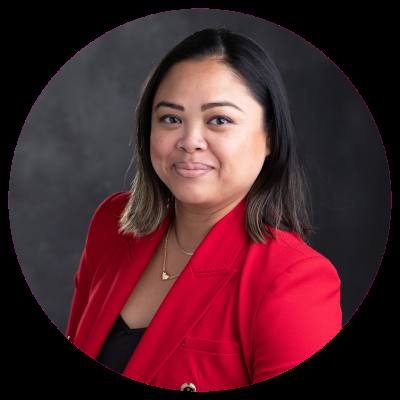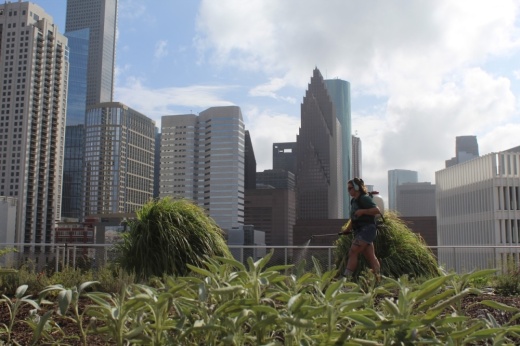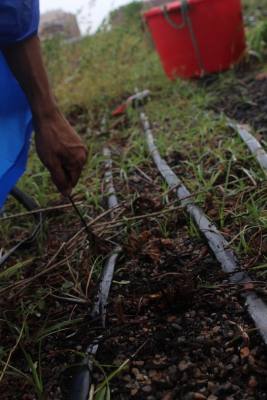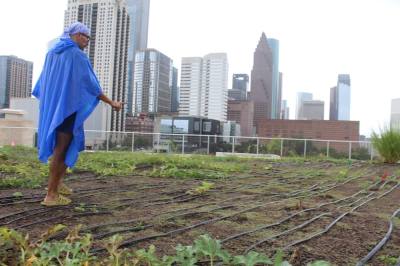During one of the rare days when Houston saw rain in its forecast after brutal record-breaking summer temperatures, Cath Conlon carted trays of vegetables through the elevators at a multiuse development in the heart of Downtown Houston. The president and CEO of the nonprofit Blackwood Educational Land Institute wasn’t at the wrong building, even though it housed everything from restaurant pop-ups and coworking spaces.
Instead, she was headed to bring fresh crops from her Hempstead farm to one of biggest urban rooftop farms in Texas, Blackwood’s Skyfarm. Located at POST Houston, the farm laboratory, as they call it, experiments with different regenerative agricultural techniques such as permaculture in a distinctive urban rooftop soil setting. The nonprofit also hosts various educational experiences for guests, volunteers and anyone who is interested in becoming what it calls eco-literate.

With its fresh, organic produce, the organization’s mission is to build community around food, reduce its carbon footprint and create healthier outcomes for the city with every piece of food that is distributed, sold and eaten.
Conlon and her lead farmer, Aaron Flores, were delighted that their scorched rows of crops could bask in drops of water coming from the sky.
“What I would like most people to understand about what extreme weather does to food production is it just really shortens windows. It’s cutting our seasons terribly short. August is becoming a time you cannot grow food. What is that going to look like if we're losing whole months of the year where we can’t produce food?” Flores said.

Along the 1-acre rooftop farm, some rows were empty for next season, and some rows were filled with crops that thrived in the heat, such as the hibiscus and basil plants. Toward the western side of the farm were pops of colors with the pale orange pumpkins and green watermelons. If every crop has its own how-to-survive story, then connected to each watermelon and pumpkin would be the stories of the young people who participated in Skyfarm’s latest educational program with the Harris County Juvenile Probation Department.

The details
In June, Blackwood piloted an eight-week program to provide urban agricultural education to residents in juvenile detention facilities by bringing in plants twice a week. Each youth has their 8-by-10 cell, Flores said, in a unit of 15 cells. There’s no outside. Food comes to them, and they’re constantly being moved around. Theoretically, the youth are only supposed to be there for a couple of days before they see a judge, but he said plenty of kids get lost in the system or have to deal with court backlogs, so those young people could be there for months, he said.
The Skyfarm leaders had to get creative in order for the program to work. After going over ideas last spring and bringing it to fruition this summer, looking back, Flores and Conlon said their team couldn’t have been happier with how the youth engaged with them. Whether it was discussing the historical relationship between food and humans, to racial injustice and food production, Conlon said the youth asked intelligent questions throughout the program.
“They’re very young, pliable brains. There’s so much room to help mold them into being the best person that they can be, if they want to be,” Conlon said.
The nonprofit’s leaders worked with Harris County’s 315th District Court Judge Leah Shapiro in order to get the program running. She said she was glad to support a program that is connected with other youth intervention programs throughout the county, including the Harris County Leadership Academy in Katy and Harris County Youth Village in Seabrook. For this farm-based/detention center program, Shapiro said it was the first time for a program of this scale to happen.

Quote of note
“I think it has been an amazingly positive impact for the children. When I checked in or communicated with members of the probation department, they couldn't praise Blackwood enough for the efforts that it took for this program to be successful,” Shapiro said.
Going forward
As the fall season begins, Flores said they will plan for a return in the spring semester, since the youth operate on Houston ISD’s calendar. During the afternoon, another Skyfarm member began his shift watering the crops with a special water solution.

August Stubler was first introduced to Blackwood farm and its learning opportunities as a young student at the farm's main Hempstead location. He graduated with a bachelor's degree in sustainable community development and a master's degree in sustainable food systems. With that knowledge and experience, Stubler decided he wanted to work on the Texas farm full time.
“It’s definitely a very rewarding job. I think that one of the more important aspects of education should be placed-based. You should know the place that you're from, and I feel like a lot of us are disconnected from that. So having this farm on top of a building that people would come to anyways is a really great way to connect,” Stubler said.







